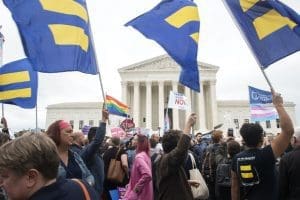Supreme Court decision allowing religious schools to discriminate will hurt LGBTQ people
LGBTQ advocacy groups say the decision could harm the labor rights of teachers at religious schools.

On Wednesday, the Supreme Court ruled that religious schools are allowed broad exceptions from employment discrimination claims.
In the 7-2 ruling for Our Lady of Guadalupe School v. Morrissey-Berru, the Supreme Court said religious employers have a “ministerial exception” and have more freedom to make decisions about their workers than other employers and organizations.
Advocates for LGBTQ equality say Wednesday’s ruling could be used against LGBTQ teachers and other LGBTQ people employed by religious institutions. And the decision comes just weeks after the court handed down a huge victory for LGBTQ workers.
Morrisey-Berru and another similar case, St. James School v. Biel, involved teachers who brought cases against their schools alleging age discrimination and an illegal firing over a request for time off due to a medical concern, respectively.
The schools argued that the “ministerial exception,” an established legal doctrine that says religious institutions can’t be sued for employment discrimination against the “ministers” it appoints, protected them. But a previous Court ruling on the issue did not explain how courts should understand who is a minister in these cases.
Justice Samuel Alito delivered the opinion, writing, “independence of religious institutions in matters of ‘faith and doctrine’ is closely linked to independence in what the Court has termed ‘matters of church government.'”
He added, “For this reason, courts are bound to stay out of employment disputes involving those holding certain important positions with churches and other religious institutions.”
In her dissent, Justice Sonia Sotomayor, joined by Justice Ruth Bader Ginsburg, said, “This Court has lamented a perceived ‘discrimination against religion.’ Yet here it swings the pendulum in the extreme opposite direction, permitting religious entities to discriminate widely and with impunity for reasons wholly divorced from religious beliefs.”
Advocates for workers’ rights, including LGBTQ workers’ rights, agree, saying that the court’s definition of a minister in Wednesday’s decision is overly broad.
Sharita Gruberg, senior director for the LGBTQ Research and Communications Project at the Center for American Progress, said the decision narrows protections for Title VII of the Civil Rights Act of 1964.
In June, the court held, in a 6-3 ruling, that Title VII, which bars employment discrimination based on sex, also prohibits discrimination against LGBTQ people.
“While the case didn’t directly address discrimination based on sexual orientation or gender identity, the Court’s expansion of employees exempt from Title VII’s protections will almost certainly be weaponized against LGBTQ teachers and possibly even other employees of religious institutions in the future,” Gruberg said.
Jennifer C. Pizer, senior counsel and law and policy director for Lambda Legal, a civil rights organization focusing on the LGBTQ community, stated that the decision “threatens the continued employment and financial security of thousands of teachers at religiously affiliated schools.”
Pizer explained that the decision also stretches the definition of a minister to include people whose work may have little connection to spreading faith.
“Teachers of secular subjects are not clergy by any reasonable understanding of the word. They should not be deemed clergy simply to shield their employers from liability for wrongful workplace practices,” she said.
“The ministerial exemption especially should not apply to strip protections from teachers with secular roles at large educational institutions that serve the entire general public, regardless of whether those institutions have some sort of religious ties,” she added.
Nick Little, vice president and legal director of the Center for Inquiry, an organization with a mission to support a secular society, said including grade school teachers in the exception is “ridiculous.”
“To expand an exemption for ‘ministers of the faith’ to the point that it includes these grade-school teachers is frankly ridiculous.” Nick Little, vice president and legal director of the Center for Inquiry, an organization with a mission to support a secular society, said. “One of these teachers’ positions was not even limited to members of the school’s faith, so it beggars understanding how her job could have been considered vital to its theological integrity.”
Little stated, “Religious groups, which control the vast majority of private schools, multiple private universities, and a growing number of medical facilities and hospitals, can now hire and fire employees at will, discriminating without reservation.”
Published with permission of The American Independent Foundation.
Recommended

Biden calls for expanded child tax credit, taxes on wealthy in $7.2 trillion budget plan
President Joe Biden released his budget request for the upcoming fiscal year Monday, calling on Congress to stick to the spending agreement brokered last year and to revamp tax laws so that the “wealthy pay their fair share.”
By Jennifer Shutt, States Newsroom - March 11, 2024
December jobs report: Wages up, hiring steady as job market ends year strong
Friday’s jobs data showed a strong, resilient U.S. labor market with wages outpacing inflation — welcome news for Americans hoping to have more purchasing power in 2024.
By Casey Quinlan - January 05, 2024
Biden’s infrastructure law is boosting Nevada’s economy. Sam Brown opposed it.
The Nevada Republican U.S. Senate hopeful also spoke out against a rail project projected to create thousands of union jobs
By Jesse Valentine - November 15, 2023








































































